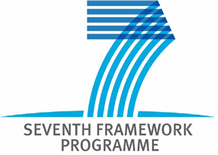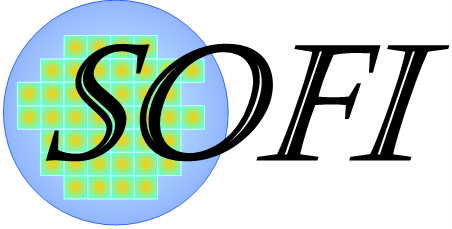SOFI - Silicon-Organic hybrid Fabrication platform for Integrated circuits
News
upcoming 2013-09-22 Presentation of SOFI results by R. Palmer and C. Weimann at ECOC 2013 in London, UK
2013-06-30 Official end of the SOFI project
2013-06-27 EU FP7 Projects SOFI/NAVOLCHI special session at ICTON 2013 on "CMOS Fabrication-Based Photonic Technologies for Communications", Cartagena, Spain
2013-05-16 Presentation of SOFI results by D. Korn in talk "Silicon-Organic Hybrid (SOH) IQ Modulator for 16-QAM at 112 Gbit/s" at CLEO Europe, Munich, Germany
2013-04-08 EuroPhotonics Spring School near Karlsruhe, Germany with SOFI contribution taking place April 8-10, 2013
2013-03-17 SOFI results at OFC (The Optical Fiber Communication Conference and Exposition, Anaheim, CA, USA) 2013
Corning Best Student Paper Award granted to Robert Palmer from KIT for publication of results from SOFI.
Postdeadline presentation PDP5C.4 by D. Korn from collaboration with EU FP7 project GALACTICO.
2013-02-05 Presentation of SOFI results by L. Alloatti in invited talk "Silicon-organic hybrid devices" at SPIE Photonics West 2013 in San Francisco, United States.
2013-01-25 Organization of a SOFI special session at ICTON 2013, taking place on 23-27 June in Cartagena, Spain. The session is co-organized by the EU project NAVOLCHI (Silicon-Plasmonic Platform for Chip-to-Chip Interconnection), chaired by Dr Emmanouil-P. Fitrakis (AIT, lead), Dr Panagiotis Zakynthinos (AIT), Prof. Juerg Leuthold (KIT) and Dr Ioannis Tomkos (AIT). See icton-2013 for further details.
Main Objectives
In the SOFI project, new active optical waveguides and integrated optoelectronic circuits based on a novel silicon-organic hybrid technology are introduced. The technology is based on the low-cost CMOS process technology for fabrication of the optical waveguides - allowing for the convergence of electronics with optics. It is complemented by an organic layer that brings in new functionalities so far not available in silicon. Recent experiments have shown that such a technology can boost the signal processing in silicon far beyond 100 Gbit/s - which corresponds to a tripling of the state-of-the art bitrate.SOFI focuses on a proof-of concept implementation of ultra-fast ultra-low energy optical phase modulator waveguides such as needed in optical communications. These devices will ultimately be used to demonstrate an integrated circuit enabling the aggregation of low-bitrate electrical signals into a 100 Gbit/s OFDM data-stream having an energy consumption of only 5 fJ/bit. However, the SOFI technology is even more fundamental. By varying the characteristics of the organic layer one may also envision new sensing applications for environment and medicine.
The suggested approach is practical and disruptive. It combines the silicon CMOS technology and its standardized processes with the manifold possibilities offered by novel organic materials. This way, for instance, the processing speed limitations inherent in silicon are overcome, and an order-of-magnitude improvement can be achieved. More importantly, the new technology provides the lowest power consumption so far demonstrated for devices in its class. This is supported by calculations and first initial tests. The low power consumption is attributed to the tiny dimensions of the devices and to the fact, that optical switching is performed in the highly nonlinear cladding organic material rather than in silicon.
The project aims at exploring a novel high-impact technology, where IP has already started to be created.
At a Glance
| Project Coordinator: |
supported by: Dietmar Korn Karlsruher Institute of Technology Tel: +49-721-608 2487 Fax: +49-721-608 9097 |
| Project number: | 248609 |
| Duration: | 01/2010 - 06/2013 |
| Total Cost: | 3.5M€ |
| EC Contribution: | 2.5M€ |

